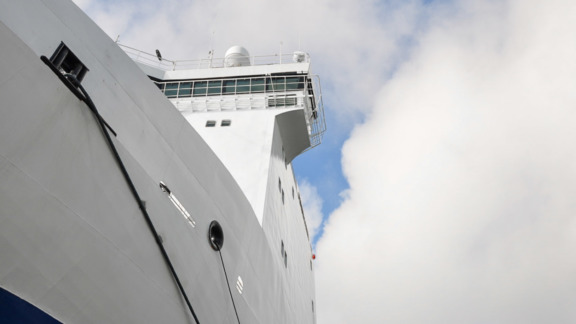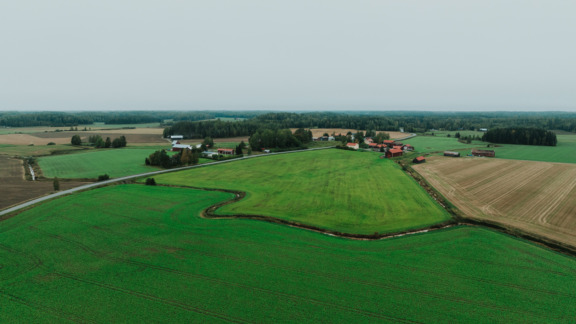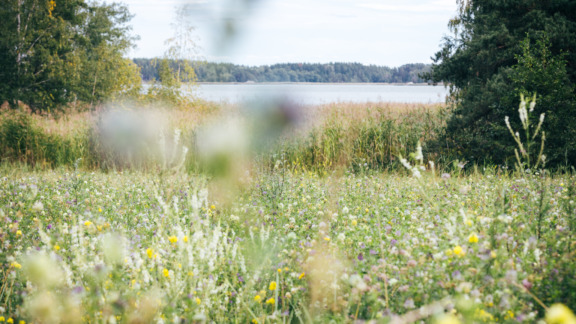Strategic Funding for Carbon Action targets
– STN MULTA, a major project designed in the Carbon Action platform, receives research funding from the Strategic Research Council (SRC) at the Academy of Finland.
The ambitious goals of the Carbon Action platform have taken a momentous leap forward as funding for the STN MULTA research consortium led by the Finnish Meteorological Institute has been granted for 3 years. The Carbon Action platform, launched by Baltic Sea Action Group (BSAG) in 2017, works to promote and verify the carbon sequestration of agricultural land. The three-year funding was granted through the Strategic Research Council’s Program Call titled “Towards a Sustainable, Healthy and Climate-neutral Food System (FOOD)” and it will enable long-term research on soil carbon sequestration and carbon storage and the continued work of the Carbon Action pilot.
The aims of the Multi-benefit solutions to climate-smart agriculture (MULTA) project are (i) to develop climate-friendly farming practices that benefit the food system, (ii) to experiment on farms, (iii) to develop a carbon-proofing system, and (iv) to develop economic and other tools to implement these solutions in Finland and elsewhere. Like the Carbon Action platform, STN MULTA develops and carries forward holistic systemic change with farmers, businesses and decision-makers.
“The food system is facing great challenges. It should be a significant part of climate change mitigation and at the same time produce healthy food for a growing population”, Jari Liski, Research Professor at the Meteorological Institute says.
“Sequestrating carbon to agricultural land is a big opportunity for the food system to respond to the climate crisis. We expect STN MULTA to provide desperately needed answers to questions that are asked globally”, Liski continues.
“The regenerative agriculture at the heart of STN MULTA offers not only climate mitigation but also other benefits. It improves soil condition, crop security and yields, increases biodiversity, food quality, nutrient and water retention, and thus reduces nutrient loads to the Baltic Sea”, says Saara Kankaanrinta, Chair of the Carbon Action steering group and the BSAG Foundation.
“Combining climate, Baltic Sea and biodiversity work and turning the agricultural paradigm is more important than ever. Expertise can become a real strategic advantage for Finland. We are in an enormous hurry to solve these crises, and we thank the Strategic Research Council for making our work possible”, Kankaanrinta summarizes.
The Baltic Sea Action Group is responsible for the interaction of the multi-benefit STN MULTA project, the mission of which is to ensure that interaction and strategic communication lead to maximum impact. Co-operation with all stakeholders has already begun at the project planning stage and the interaction is continuous and takes place across all project activities.
“The role of BSAG in bringing together research and practice has been unique in Carbon Action. I don’t think any other actor would even have dared to go as big as BSAG when they started planning Carbon Action and getting the scientists involved. The interaction of STN MULTA could not be in better hands”, Liski says.
The consortium is led by the Finnish Meteorological Institute and the other members are Baltic Sea Action Group, University of Helsinki, Natural Resources Institute Finland, Finnish Environment Institute SYKE, and University of Zurich.
The project has an impressive and extensive team of national and international members: a multidisciplinary research consortium and diverse stakeholders.
The consortium partners:
Jari Liski, Finnish Meteorological Institute
Annalea Lohila, University of Helsinki/Institute for Atmospheric and Earth System Research
Anna-Liisa Laine, University of Zurich
Laura Höijer, Elävä Itämeri säätiö (Baltic Sea Action Group, BSAG)
Risto Uusitalo, Natural Resources Institute Finland
Jussi Heinonsalo, University of Helsinki
Tuomas Mattila, Finnish Environment Institute
Other researchers:
Finnish Meteorological Institute: Liisa Kulmala, Julius Vira, Mika Aurela, Miia Salminen
Natural Resources Institute Finland: Kristiina Regina, Hannu Fritze, Tapio Salo, Helena Soinne, Jaakko Heikkinen, Taina Pennanen
University of Helsinki: Karoliina Huusko, Mari Pihlatie, Kristiina Karhu, Noora Manninen, Sanna Kanerva, Markku Ollikainen, Sanna Lötjönen, Bartosz Adamczyk
BSAG: Pieta Jarva, Michaela Ramm-Schmidt, Kaj Granholm, Paula Biveson
STAKEHOLDERS:
100 carbon farmers
Ministries:
Ministry of Agriculture and Forestry, Ministry of the Environment & Ministry for Foreign Affairs
Companies:
Valio Oy, Apetit Ruoka Oy, Fazer Group, Suomen Osuuskauppojen Keskuskunta S group / SOK, Altia Oyj, Viking Malt Oy
Other national stakeholders:
Liisa Pietola, The Central Union of Agricultural Producers and Forest Owners (MTK)
Pekka Heikkinen, Qvidja Farm
Juuso Joona, Tyynelä farm
Sari Peltonen, Finland Association of ProAgria Centres
Rikard Korkman, Finland Central Union of Swedish-speaking Agricultural Producers in Finland
Susann Rännäri, Finland Luomuliitto ry – Finnish organic farmers association
Fredrik von Limburg Stirum, Koskis Estate
Hanna Mattila, Sitra
Teemu Lehmusruusu, Telling tree art+rsrch
Agricultural Educational Institutions:
Häme University of applied sciences
International researchers:
Germany: Christopher Poeplau, Thünen Institue of Climate-Smart Agriculture & Peter Leinweber, Germany University of Rostock & Axel Don, Johann Heinrich von Thünen Institute
Estonia: Maarja Öpik, University of Tartu
China: Chao Liang, Chinese Academy of Sciences
France: Lauric Cecillon, Laboratoire de Géologie de l’Ecole Normale Supérieure & Jean-Francois Soussana French National Institute for Agricultural Research (INRA) & Jussi Lankoski, Organisation for Economic Co-operation and Development (OECD)
Netherlands: Rachel Creamer, Wageningen University
Spain: Raul Zornoza, Universidad Politécnica de Cartagena
United States: Keith Paustian, Colorado State University
United Kingdom: Jonathan Hillier, The University of Edinburgh
Sweden: Per Weslien, Sweden University of Gothenburg
Denmark: Berit Hasler, Aarhus University Research
International networks:
Carbon Farming North Sea Region project/ network
4 per 1000 initiative Secretariat
ICOS ERIC Integrated Carbon Observation System (ICOS)



